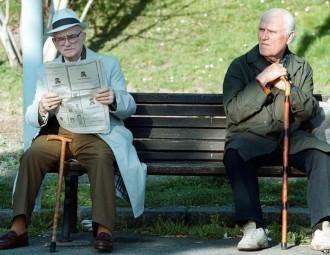Aliaksandr Vaitovich: It is elderly people who hold up Belarusan science

In Belarus, science can be registered in the Red Book as an endangered activity category.
In Belarus, there is a lot of talking about science, but little is done for its revival. In result, a certain vacuum among scientists has been developed: more successful are leaving the country, whereas elderly people and the youth stay in the country. However, given the first opportunity, youth tends to leave the country. Aliaksandr Vaitovich, the academician and the chief of the National Academy of Sciences of Belarus during 1997-2001, discussed these issues in the talk with the EuroBelarus Information Service.
- On January 23-25 Belarus will celebrate the 85th anniversary ofthe National Academy of Sciences. What results can be made on the threshold of this event?
- I could name some interesting and important results and developments; but on the whole, the situation with science is getting worse. There is no development in the science since Belarus got its independence. Quite the opposite, it has severely retrograded in the beginning, and neglected afterwards.
- In what situation is science now?
- In a very grave situation. Average world value of science expenses from GDP is 2.2 per cent, whereas in Belarus this indicator hasn’t exceeded 0.7-0.8 per cent over a decade. And an indicator less than 1.8 per cent means that science is dying. CIS countries spend $67.9 thousand on research and development per one researcher; developed countries spend $208 thousand and developing countries $132 thousand accordingly. And in Belarus these expenses in 2012 made only $22.2 thousand. However, we have managed to save scientific potential, and we should revive and develop it before it ceases to exist.
- We have potential, but promising youth is leaving the country. What is the situation with the personnel?
- We got lots of problems due to the wrong state politics. Science is no longer prestigious; that is the reason why young people don’t want to be scientists. Scientists have low salaries, and feminization is taking place because of that – as women are often more satisfied with low salaries than men. One of the main problems is critical shortage of modern equipment, without which development is impossible. Cooperation between science and industry is poor in Belarus; and due to that science doesn’t contribute much into industry.
Belarus got independence more than 20 years ago, while science is similar to that in Soviet Union. It should be reformed without delay. Let me note that the first attempt to reform science in 2002-2005 completely failed due to the unprofessional science management. Program of science development should be part of the country’s development program; and that is out of question in Belarus.
- The necessity to develop science has been discussed for many years. Are there any steps taken in this regard?
- It is mostly about talking and less about doing; though there is some hope. Thus, in December last year at the Session of General Meeting of the National Academy of Sciences a program for improvement of scientific sphere of the Republic of Belarus was adopted. It provides for significant and science reforming arrangements. However, their realization is unclear.
To develop science, we should work hard. First we should observe the experience of the Western countries, where money is spent more sensibly. I.e. we should distinguish fundamental science, that doesn’t bring money, from applied science. The latter can bring money, and some part of it can support the fundamental science. Such concept lies in the base of the above mentioned program for improvement of scientific sphere of the Republic of Belarus, which, I think, is right.
Today one of the main goals is to increase the prestige of science, so that more young people become scientists. It is elderly people who hold up fundamental science in the country, with only few young people, many of whom will leave the country. But development of science is also linked to other spheres. Thus, today the level of preparation in schools and universities has dropped. We should work on this today, until it’s too late. If we miss the moment, science will retrograde once and for all. And to revive the science, the state would have to train specialists abroad and create all conditions for them to come back to Belarus, which will cost much more.
-
03.01
-
07.10
-
22.09
-
17.08
-
12.08
-
30.09



























